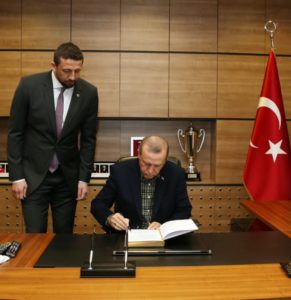Abdullah Bozkurt/Stockholm
American professional basketball team Portland Trail Blazers player Enes Kanter faces nine outstanding arrest warrants issued by Turkish authorities as part of an intimidation campaign to stifle dissent, suppress opposition voices and crack down on freedom of expression.
According to official documents dated July 12, 2021 and obtained by Nordic Monitor, Turkish prosecutors have sought the arrest of Kanter for defamation and terrorism, the two most abused criminal charges used by the government of Islamist President Recep Tayyip Erdoğan to punish critics, opponents and dissidents at home and abroad.
The 29-year-old NBA player was issued six arrest warrants for allegedly defaming President Erdoğan, the oppressive leader of Turkey who has locked up tens of thousands of his critics for simply exercising their right to dissent and freedom of speech.
The warrants were issued in 2017, 2019, 2020 and 2021 by investigating judges who run special project courts called the Penal Courts of Peace ( Sulh Ceza Hakimlikleri, SCH) in Istanbul, Ankara and Yozgat provinces. The SCH court was the idea in 2014 of President Erdoğan, who called it a special project to hunt down his critics. The benches of SCH courts are staffed by partisans and loyalists who act in line with Erdoğan’s wishes.
Although he has been under constant threat from the Turkish government and its proxies, Kanter has never shied away from criticizing the Erdoğan government’s abysmal record in human rights violations and restrictions on fundamental freedoms. He has appeared in US and international media to raise awareness of rights violations and abuses in Turkey.
Official document details nine arrest warrants issued for NBA player Enes Kanter on dubious charges:
The Stockholm Center for Freedom reported in March 2021 that Turkish prosecutors investigated 128,872 people for insulting Erdoğan between 2014 and 2019, resulting in prison sentences for nearly 10,000 people with many cases still pending. The crackdown targeted 318 minors between the ages 12 and 17 who have been the subject of criminal investigations for insulting the head of state.
Article 299 of the Turkish Penal Code (TCK) states that any person who insults the president of the republic faces a prison term of up to four years. This sentence can be increased by a sixth if it has national exposure, and by a third if committed by the press or media. In total 9,554 people have been handed down sentences for insulting the president.
In a 2016 opinion the Venice Commission, the Council of Europe body specializing on constitutional matters and the rule of law, sounded alarm bells on abuse of defamation charges. It noted with concern the large number of investigations, prosecutions or convictions reported by the press for insulting the president.
The European Commission also highlighted the abuse of slander charges by President Erdoğan in its 2015 report and said, “There is a widened practice of court cases for alleged insult against the President being launched against journalists, writers, social media users and other members of the public, which may end in prison sentences, suspended sentences or punitive fines.”

One arrest warrant for Kanter was issued by an Istanbul court at the request of Erdoğan advisor Hidayet Türkoğlu, who filed a criminal complaint against Kanter alleging defamation. Using the weight of the president’s office, Türkoğlu got a prosecutor to indict Kanter, who faces up to four years in prison on this charge alone.
Türkoğlu, a former NBA player who was suspended in 2013 for violating the terms of the NBA’s anti-drug program, is also president of the Turkish Basketball Federation. Türkoğlu was photographed in 2019 with the leader of an organized crime syndicate, Galip Öztürk, a pro-Erdoğan figure who fled abroad after being convicted of murder.

Two arrest warrants issued for Kanter originated from terrorism charges because of Kanter’s affiliation with the Gülen movement, a civic group that is critical of the Erdoğan regime. The movement is inspired by Turkish Muslim scholar Fethullah Gülen, a US resident and a fierce opponent of the Erdoğan government on a range of issues from pervasive corruption in the administration to Turkey’s aiding and abetting of armed jihadist groups.
Erdoğan’s government branded Gülen as a terrorist in 2014, immediately after major corruption investigations that were made public in December 2013 and which incriminated Erdoğan, his family members and political and business associates. He accused Gülen of instigating the corruption probes, a claim that was denied by Gülen.
The Turkish president also accused Gülen of orchestrating a 2016 coup attempt that in fact helped Erdoğan consolidate power, dismantle the rule of law, sideline the parliament and remove checks and balances on his rule. Gülen denied having any role in the putschist attempt and asked for an international probe, a claim that was rejected by Erdoğan. The government has failed to present any evidence proving Gülen’s complicity in the abortive putsch.
Many believe the failed coup was a false flag operation orchestrated by Erdoğan and his intelligence and military chiefs to set up the opposition for a crackdown. During coup trials, evidence emerged that many operatives of the intelligence agency had worked to make the limited military mobilization appear to be a real coup attempt.
A total of 292,000 people affiliated with the movement have been detained, while 96,000 others have been jailed in the last five years according to a figure announced by Interior Minister Süleyman Soylu in September.
According to statistics released by the Council of Europe (CoE), as of January 2020 out of 30,524 prisoners convicted on terrorism charges in the 47 CoE member states, 29,827 were in Turkey. In other words, 98 percent of all inmates convicted of terrorism in all of Europe are resident in Turkey. It shows how the government abuses its counterterrorism laws to punish critics, opponents and dissidents in this country of 84 million that is suffering under the iron grip of President Erdoğan.
The Turkish government also tried to kidnap Kanter in 2017 while he was on a goodwill tour in Indonesia and had to leave the country for his safety. His passport was briefly seized by Romanian police upon a request from the Erdoğan government, but he managed to get back to the US after intervention by the NBA and US government officials.












